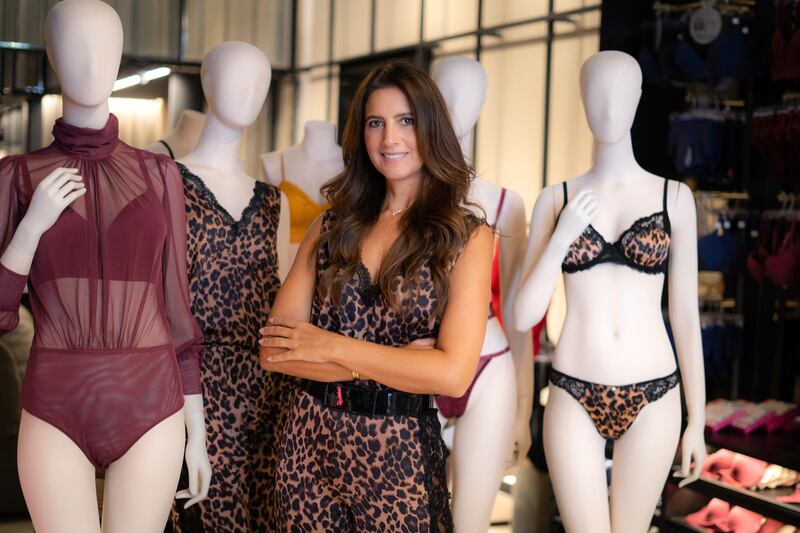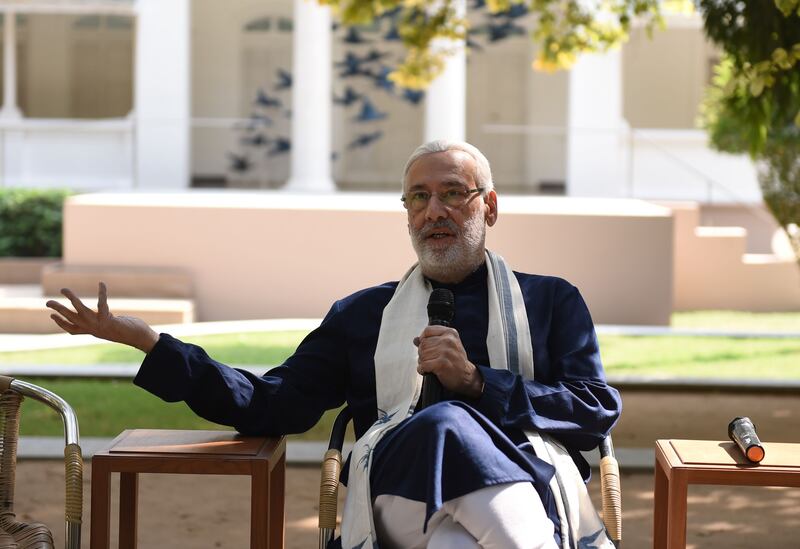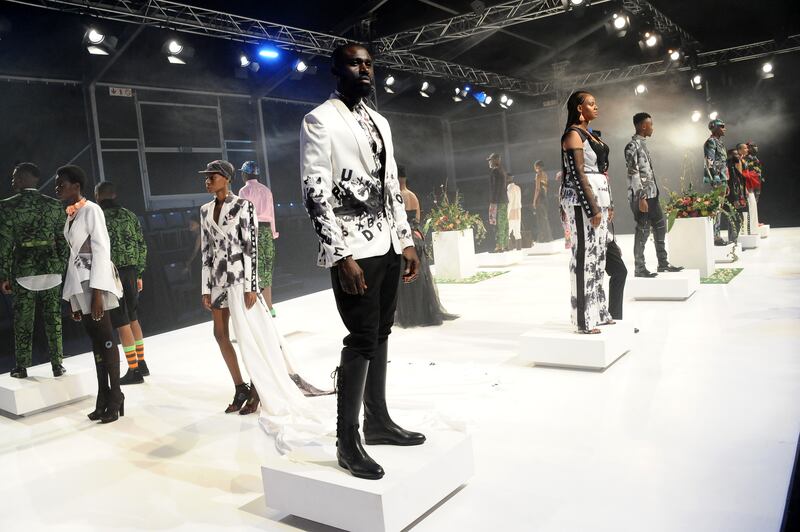
The Business of Fashion
Agenda-setting intelligence, analysis and advice for the global fashion community.

Agenda-setting intelligence, analysis and advice for the global fashion community.

Introducing our latest BoF Professional briefing, Worldview, your weekly analysis on the global markets that increasingly drive growth in fashion, including spotlights on must-know people, companies and places, and a round-up of international news.
Investing In a New Kind of Brazilian Bombshell

“I’ve never told anyone this before,” confides Sandra Chayo. Less than a month before her father died last year, Chayo had to present him with a radical image overhaul of the lingerie company he founded five decades earlier. “I could only fix my eyes on his reaction; I really thought I was going to shock him,” recalls the Brazilian marketing executive.
Even though he was in some ways ahead of his time, her father Nissim Hara was a product of his generation. Hara had emigrated from Lebanon to Brazil after he was left fatherless at the age of 12 and spent his teens working to support the family until his uncle sent him to São Paulo. There, he eventually set up a small underwear business in the 1960s that grew into one of Latin America’s foremost lingerie players, Grupo Hope.
ADVERTISEMENT
Hara became something of a marketing maverick, pioneering product placement in prime-time soap operas that were huge hits in 1980s Brazil, like “Roque Santeiro,” before launching what Chayo says was Brazil’s first bus billboard in the 1990s and creating satirical ad campaigns during the political and economic crises of the country’s ‘lost decade’ to offer the public a bit of light relief.
But as time went on, the brand’s campaigns became increasingly restrained and formulaic — especially the castings — as Hara’s company began to rest on its laurels. It was time for his daughter Chayo, who had spent years working her way up from the factory floor on the outskirts of Fortaleza to marketing director in a sleek São Paulo office, to make her big move at the family firm.
In her father’s twilight year, Chayo proposed a casting overhaul. It wasn’t revolutionary by international standards but she reasoned it probably was for a man in his 80s — not least because it represented a dramatic departure from the narrow definitions of beauty that were de rigueur for Brazilian lingerie brands in her father’s lifetime.
She proposed casting Anitta, currently Brazil’s biggest pop export and a Latin music sensation who has gained even wider crossover appeal since collaborating with the likes of Cardi B, Snoop Dogg and J Balvin. A complex and sometimes contradictory character, Anitta has become a sex symbol to many at home and abroad as well as an increasingly outspoken voice about race, class and politics in Brazil’s increasingly polarised society, courting controversy along the way.
Chayo’s choice of Anitta must have come as a surprise to her elderly father, a man who was used to giving contracts to far less edgy brand ambassadors like the heavily scripted telenovela actress Juliana Paes and supermodels in the template of Gisele Bündchen. But Chayo was equally surprised by his verdict on the “bombshell from the favela,” as Anitta has been described by certain onlookers.
“He asked me, as a woman, if I liked to be represented by women [like Anitta and others in the comparatively diverse casting]” that included more women of colour, plus-size models, and women in their 40s than the brand’s previous marketing campaigns had. “When I said yes, he said … that the most important thing in business and in life is to adapt [and] be brave.”
However much her father’s nod of approval meant to Chayo, you get the distinct impression she was never really prepared to present him with a plan B. If she ever did have a wobble about the casting, Anitta’s 53-million-strong community on Instagram would have put things back into perspective, bringing unprecedented reach, international attention and newfound relevance to the brand.
But Chayo knows she needs a whole lot more than buzzy castings to strengthen the foundations of a brand like Hope and fend off the competition from fellow Brazilian lingerie brands DeMillus and Duloren.
ADVERTISEMENT
“I was practically born in this industry,” she counters. “We understand our clients’ needs.”
Having recently resurrected the brand’s product placement strategy in popular soap operas on the Rede Globo network, she is also investing in an army of micro-influencers on TikTok and YouTube and experimenting with live commerce. Next is an ambitious expansion plan, with a goal to double Hope’s brick-and-mortar stores in the next four years, to over 400 in total.
The Bottom Line: Seen through the lens of diversity, Hope’s casting of women of colour like Anitta and others is significant, but the mostly white castings traditionally used by Brazilian apparel brands represent a low baseline for comparison. As calls for greater representation of Black Brazilians and people of colour grow, local brands across the industry are expected to make more progress recruiting both behind the scenes and in front of the camera.
The Indian ‘Denim King’ Facing Battles on Several Fronts

In the midst of a second wave of Covid-19, India is on the verge of another humanitarian crisis. The latest surge has prompted the closure of non-essential retailers in several states, meaning the country’s apparel and textile producers can anticipate another round of delayed orders and some smaller players are likely to close down for good, leaving more fashion industry workers jobless.
Companies across the board have felt the financial impact over the past year, with many of India’s apparel giants noting a decline. Arvind Limited, one of the world’s largest denim manufacturers and supplier to brands including Tommy Hilfiger and Calvin Klein, reported a 19 percent decline in revenue to 1,514 crore rupees ($207.65 million) for the third quarter ending Dec. 31, compared to the same period a year earlier. Blaming the pandemic, Gap ended its partnership with the conglomerate’s subsidiary Arvind Fashions last year, six years after the latter signed on as Gap’s master franchisee for India.
Punit Lalbhai, an executive director of the company, whose operations include a vast retail network across India, told BoF last April that “over the next six to eight months we do not expect to run more than 50 percent capacity, though it is too early to tell if even that much will be possible.” Prior to the pandemic, Arvind produced over 100 million metres of fabric and 6 million pairs of jeans annually for its domestic labels. Before the second wave hit, Arvind was looking to the beauty category to help drive its recovery, as the group has had a license with Sephora India since 2015. But now, Punit and his father Sanjay Lalbhai, India’s ‘denim king,’ must be wondering how much even that will help mitigate the damage.
The Bottom Line: Though vertically integrated players like Arvind are facing especially challenging times, the conglomerate’s board has recently approved measures to raise capital to strengthen its balance sheet and analysts are encouraged by the group’s newly formed Arvind Youth Brands subsidiary ever since it attracted investment from Walmart-owned Flipkart last year.
ADVERTISEMENT
South Africa’s ‘City of Gold’ Is Making Gains on Cape Town

The sometimes-friendly rivalry between Joburgers and Capetonians is the stuff of legend. Though it usually centres around music, sport or entertainment, anything seems to trigger the competitive streak between South Africa’s biggest cities — even something as seemingly improbable as logistics. Just this month it was revealed that Johannesburg had lured FedEx to launch its high-tech hub there, much to the annoyance of some in Cape Town who had expected their city to snag the deal since it had just attracted Amazon to set up its African headquarters there.
In terms of fashion business cred, Cape Town had long overshadowed Joburg partly because of its status as an established tourism hub with a highly developed retail and hospitality sector. But Joburg has been flexing its economic and cultural muscle in recent years and is now the base of the country’s longest-running fashion week, which kicks off this week by broadcasting a digital edition at the city’s Mall of Africa. Lucilla Booyzen, founder and director of South African Fashion Week, called Johannesburg the “ideal location” for the event because it “truly represents the cultural and social mix that makes up our [nation’s] demographic.”
Historically, “Johannesburg-based designers have had to look to a broader business approach [than their counterparts in Cape Town who could depend more on tourism] in order to maintain their operations, nurturing local retail opportunities and maintaining a private client base [instead],” Booyzen explains. Additionally, Joburg brands were less exposed to the collapse of tourist spending during the pandemic than their Capetonian counterparts. Besides, proud Joburgers will always contend, their hometown’s nickname, ‘the city of gold,’ is as much about its destiny as its past.
The Bottom Line: Johannesburg may be gaining an edge over Cape Town, but each city has strengths and weaknesses. In the short term, both will remain important hubs for international fashion retail in South Africa and potential regional headquarters for the wider continent in the medium term. Some fashion insiders believe that longer term, their industries will develop a more complementary relationship akin to that of New York and Los Angeles in the US market.
GLOBAL MARKETS NEWS IN BRIEF
FASHION, BUSINESS & ECONOMY
Indian industry continues to suffer amid a second wave. According to Kumar Rajagopalan, chief executive of the Retailers’ Association of India (RAI), a ban on the delivery of non-essential goods is already causing havoc, “making it impossible for retailers to survive,” he said in a Business Standard report.
Mercado Libre takes aim at Mexico market dominance. Mercado Libre will invest $1.1 billion to boost its Mexican operations by enhancing its financial solutions platforms and logistics as well as doubling the space of its warehouses and distribution centres.
Gulf bidders in the running to buy Ralph & Russo. Several Arab bidders are in the running to purchase Ralph & Russo, according to an Arabian Business report. A handful of potential buyers from the United Arab Emirates and Qatar are reportedly in the final stages of bidding for the label, which fell into administration in March.
Joor links with Jetro to launch ‘Showcase Japan.’ The event, to be hosted on Joor’s passport platform, will connect more than 30 contemporary Japanese designers and showrooms with global buyers who will be able to shop across categories such as sustainability, diversity and traditional craftsmanship.
Amorepacific’s Q1 earnings surge 86 percent. The South Korean beauty group, which owns brands including Laneige and Sulwhasoo, reported Wednesday that its first-quarter earnings increased by almost 90 percent year-on-year thanks to online and overseas sales growth, The Korea Times reports.
New investment company launched to support African luxury brands. Led by private equity industry veteran, Laureen Kouassi-Olsson, Birimian yesterday announced its initial brand roster will include Ghanaian designer, Aisha Ayensu’s Christie Brown label, Côte d’Ivoire’s Loza Maléombho and Simone et Élise, as well as accessories label Yeba.
Japan’s retail sales rise 5.2 percent in March, beating expectations. The world’s third-largest economy’s retail sales gains beat the median market forecast of 4.7 percent growth with the fastest rise since a 6.4 percent jump in October and the first positive growth seen in four months. Retail sales rose 1.2 percent compared with the previous month.
South Korea’s retail sales rise 18.5 percent in March. Sales from offline stores jumped 21.7 percent and department stores saw sales rise 77.6 percent. Imported luxury goods sales rose 89 percent year-on-year as South Korean consumers re-routed disposable income.
Lagos Fashion Week wraps up. Lagos Fashion Week showcased nine designers over its three-day online event, entitled “Woven Threads II: Moving in Circles,” in partnership with Fashion Revolution.
Retailers brace themselves as Japan enters third state of emergency. The 17-day state of emergency that began on Sunday in order to curb an uptick in Covid-19 cases is casting a shadow on the upcoming Golden Week holiday that runs April 29 to May 5, Japan Times reports.
China to launch month-long effort in May to boost consumption. China will launch a series of promotional activities in May, including a new consumer goods expo in southern Hainan province, to boost spending as China’s retail sector recovers from Covid-19.
Mercedes-Benz Fashion Week Russia comes to a close. MBFW Russia has wrapped up, following more than 70 shows presented by designers from Russia, as well as 19 other countries, in a combined physical and digital format.
Amazon’s new Africa HQ gets the green light. A 4 billion rand ($280 million) mixed-use development that will include the new home of Amazon’s Africa operations in the city of Cape Town has been given the go-ahead by local authorities, according to a Business Tech report.
Fashion brands see online sales decline in India. Fashion brands in India, already suffering as lockdown restrictions in major consumer hubs around the country halt brick-and-mortar sales, are also losing ground online, according to an Economic Times report.
Chinese retailer Peacebird sees Q1 net profit rise by 2,222 percent. Sales revenue for the quarter also surged 93.1 percent year-on-year to 267 million yuan ($41 million). Womenswear saw the biggest growth, up 120.42 percent, while menswear sales rose 77.2 percent over the same period in 2020.
China’s Dazzle Group sees sales surge 61 percent in Q1. Chinese apparel giant, Dazzle Group, saw 2020 revenues reach 2.56 billion yuan ($385.47 million), up 7.81 percent year-on-year, while first quarter 2021 revenue rose 61 percent to 657 million yuan ($101.34 million).
THE BUSINESS OF BEAUTY
LVMH to build $154 million beauty e-commerce hub in Shanghai. French luxury conglomerate LVMH has broken ground in Shanghai on its largest e-commerce sales and storage hub for cosmetics in the Asia-Pacific region, which is scheduled to be operational by the end of next year.
New geographic ‘growth engine’ key to L’Oréal’s future. A newly-created South Asia Pacific, Middle East and North Africa zone, headquartered in Singapore, will account for the majority of L’Oréal’s new business over the coming decade, L’Oréal’s regional president, Vismay Sharma told CNBC.
Shiseido’s men’s beauty line Uno sees ‘double-digit’ growth. Video calls are pushing a growing number of Japanese businessmen to pay attention to their skincare and makeup, Shiseido officials told the Associated Press.
PEOPLE
BTS are Louis Vuitton’s new ambassadors. The French luxury brand welcomed its seven new house ambassadors on Twitter alongside a photo of the K-pop boy band clad in pastel-hued separates by the brand’s men’s artistic director Virgil Abloh.
SUPPLY CHAIN & TECHNOLOGY
Fashion artisans, small manufacturers hard hit by India’s second wave. India’s surge in Covid-19 cases and the closure of non-essential stores in several states means the country’s apparel manufacturers can anticipate another round of delayed orders, according to a report by brokerage Motilal Oswal. “The impact from the second wave could be more severe given the already weak condition of many players,” the report said in part, referring to the apparel manufacturing industry.
Alibaba launches new cargo route to satisfy Chinese luxury demand. The Chinese tech and retail giant’s logistics arm Cainiao plans to launch direct freight flights between Singapore and Hainan Island to shuttle duty-free beauty products, handbags and watches to the mainland, general manager James Zhao told Bloomberg.
Checkout.com leads $110 million round for Saudi fintech Tamara. Proceeds of the Series A capital raise, which includes both equity and debt, will be used to bankroll Tamara’s expansion across the Gulf markets by the end of this year and then the rest of the Middle East.
Tencent leads $50 million investment in Chinese fashion e-commerce firm ChicV. The tech giant’s holding company is among those betting on ChicV, a Guangzhou-based business that specialises in selling fashion cross-border and operates three sub-platforms Stylewe, JustFashionNow and NoraCora, DealStreetAsiareports.
South Korean secondhand marketplace app hits $1.8 billion valuation. Danggeun Market, the country’s top digital resale marketplace, was estimated to be worth 1.2 trillion won ($1 billion) at the beginning of the year, but its value has since skyrocketed to two trillion won ($1.8 billion), The Korea Times reports.
Global and Indian firms step up to combat India’s coronavirus crisis. Amazon.com, Intel and Google, as well as Indian firms Tata Sons, Reliance Industries and JSW Steel have pitched in with airlifts of medical equipment, funding pledges, making medical oxygen and more.
Puma sees sales hit from China backlash and freight delays. German sportswear company Puma expects a consumer backlash against Western brands in China and congestion at ports to hit its sales though it gave an upbeat outlook for 2021 following a strong first quarter.
This week’s round-up of global markets fashion business news also features the China Duty Free Group, Uniqlo’s Japanese owner and a pan-African e-commerce platform in Côte d’Ivoire.
Affluent members of the Indian diaspora are underserved by fashion retailers, but dedicated e-commerce sites are not a silver bullet for Indian designers aiming to reach them.
This week’s round-up of global markets fashion business news also features Brazil’s JHSF, the Abu Dhabi Investment Authority and the impact of Taiwan’s earthquake on textile supply chains.
This week’s round-up of global markets fashion business news also features Dubai’s Majid Al Futtaim, a Polish fashion giant‘s Russia controversy and the bombing of a Malaysian retailer over blasphemous socks.